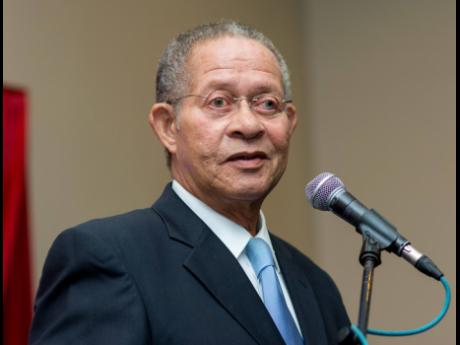Golding says COTED cannot solve Caricom soap fight
Urges reform for compliance, dispute settlement
Former Prime Minister Bruce Golding is of the view that despite the existence of the Council for Trade and Economic Development, COTED, the Caricom bloc, as currently structured, lacks an appropriate administrative mechanism to resolve the...
Former Prime Minister Bruce Golding is of the view that despite the existence of the Council for Trade and Economic Development, COTED, the Caricom bloc, as currently structured, lacks an appropriate administrative mechanism to resolve the technical issues involved in the ongoing soap dispute that has ended up in Jamaica’s Supreme Court and which has manufacturers, exporters and politicians from member countries Jamaica and Dominica trading verbal punches.
The Revised Treaty of Chaguaramas, RTC, which governs community relations, including trade between members, recognises the Caribbean Court of Justice, CCJ, in its original jurisdiction, as the final arbiter of trade disputes among members.
The court action filed on June 8 by Dominica’s DCP Successors Limited, DCPS, asks the court to exercise the option of referring the matters it raised to the CCJ for a decision.
“If you have rules, you must have means of enforcing those rules, and Caricom has none. So, the rules are violated with impunity because they have no consequences,” Golding told the Financial Gleaner in an interview on Tuesday.
His comments underscore the recommendation of a committee he chaired four years ago, for the establishment within the RTC of a body of sanctions for wilful non-compliance or flagrant breaches. That committee was set up by Prime Minister Andrew Holness to review Jamaica’s relations with Caricom and the Caribbean Forum of the African Caribbean and Pacific Group. Such sanctions, the Golding committee proposed, would include the loss of the right to vote on decisions of the Conference of Heads of Government and other organs of the Caribbean community; removing the right to benefit from Caricom institutions except in relations to disaster, public health and security; limiting access to loans and grants from Caribbean Development Bank; and opening up permission for retaliatory action against other member states for injurious breaches of the treaty.
Among their grouses, the Government of Dominica and DCPS accuse Jamaica of ignoring a November 2020 majority decision of COTED to stop issuing certificates of community origin to exporters of soap made with noodles or pellets, the raw materials they import from outside the trade bloc. This action would make Jamaican soap exports to Caricom 40 per cent more expensive as they would attract a common external tariff, CET, set at that level. The Jamaicans counter that the decision is forcing them to buy the raw materials from DCPS, whose product, they contend, does not meet their quality requirements.
Golding is still advocating for a technical group within COTED to work through and adjudicate on such matters.
“That is a technical issue and you need independent people with the technical competence to say ‘what are your requirements’ and if those requirements are reasonable. COTED is made up of politicians. Politicians were teachers and doctors and lawyers and some of them unemployed people before they became ministers. They are not competent to deal with serious trade disputes,” Golding added.
In the absence of such a technical group from the institutional arrangements of Caricom, the former prime minister, who headed the government between 2007 and 2011, is doubtful that an ad hoc technical group could be inserted in the process.
“They wouldn’t have the authority to do it. The authority rests with COTED, and COTED will argue that they have already decided the matter. We have to fix the system where the problem is,” the former PM said.
Jamaica’s continued issuing of the certificates even after the November decision was confirmed to the Financial Gleaner by Trade Minister Audley Shaw last week. He said the certificates would not be issued while the matter is before the court. The action was also confirmed by the Trade Board, the issuing authority, and a Jamaican soap exporter, Blue Power Group, which are both among the parties being sued by DCPS.
The action by Jamaica also drew sharp language from the Caricom Secretariat, usually an impartial administrator in these matters. The working document prepared for the June 1-2 virtual meeting of COTED which was chaired by Jamaica’s foreign trade minister, Kamina Johnson Smith, used uncharacteristically strong language, which would be more in keeping with Dominica’s complaint, to list, introduce and background the agenda item.
The COTED working document is usually meticulously prepared and diplomatically worded by the office of the assistant secretary general for trade and economic development with the specific positions and language of member states delineated in quotes.
It asserted, without delineation, that: “The rules are clear, the problem here is a simple lack of respect for the decisions of this august body; the disregard by the exporting member state is done knowingly, deliberate and with no care for the impact which this action has on the productive entity of a fellow member state! This very same member state, Jamaica, however, attempts to garner the support of others to move its condensed milk on to the ineligibles list and I am sure it would want adherence to the same if it is successful in this endeavour. I posit that we must treat others as we would want to be treated where decisions of this body are concerned!”
Joseph Cox, a Jamaican, is the assistant secretary general for trade and economic development.
When the soap matter involving Jamaica was discussed at this month’s COTED meeting, Johnson Smith is said to have recused herself and relinquished the chairmanship to the trade minister of Trinidad and Tobago, Paula Gopee-Scoon.

